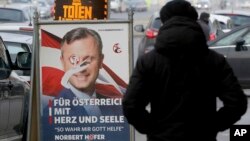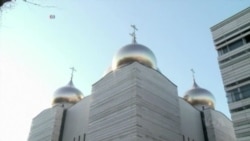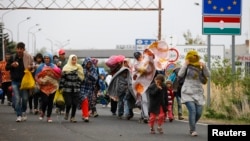Centrists and leftists across Europe are expressing relief after projections from Austria's presidential election showed far right, anti-immigrant, Euroskeptic Norbert Hofer lost by a 7 percent margin to Alexander Van Der Bellen, an independent supported by the Green Party in a race seen as a test for the strength of populist movements in Europe.
It was an angry campaign in which opponents of Hofer did not hold back in labeling him as a Nazi, often comparing him to Austrian-born Adolf Hitler. Had he won, Hofer would have been Austria's first far-right leader since World War II, and the first one ever in the EU.
On election day, some lamented the tone of the campaign, which they compared to the bruising battles leading up to Britain’s June decision to leave the European Union and the U.S. election campaign of Donald Trump.
“It’s very tragic because we were having another person, Hofer, who speaks more for the old way of thinking, of pushing people against each other and is more in a rightist direction, in a Fascist direction, like Hitler,” said Eva, a voter who cast her ballot Sunday in central Vienna.
Immigration issue
Voters in the long, bitter election were driven largely by anti-establishment sentiments and the feeling that ordinary Austrians have lost control over issues like immigration.
The statistics help explain voters' concerns, especially following the migrant crisis. Last year alone, 90,000 people, most of them Muslims, applied for asylum in Austria, equivalent to one percent of the country’s population.
But discussion of demographic changes, the need to protect Austrian culture and identity, and concerns about an eventual Islamization of Austria, for many, were reminiscent of Austria’s Nazi past.
Watch video report from VOA's Zlatica Hoke:
Analysts say politicians, including Hofer, were cognizant of this. Hofer repeatedly rejected being called a populist and did not specifically list an anti-immigrant stance as part of his official platform. But it was an underlying theme in his campaign.
Some who voted against Hofer Sunday said they agreed with his supporters that immigration is a major concern.
“I absolutely understand them. Right now we have a lot of immigrants in Austria and the rest of Europe,” said Florian, a voter in Vienna. But he said electing a far right leader was not the best option. “I voted for Dr. Van der Bellen because I believe it’s important to send a sign to the world that not everybody in Europe is prone to follow the (rightist) shift,” he said.
Austrians decided to play it safe, sticking with Austria’s post-war centrist tradition by electing the 72-year-old Van Der Bellen, drawing expressions of relief from centrist leaders across the European Union.
“The message, at least from the Austrians, was, ‘We don’t want this in the end. We’re concerned about immigration. We’re concerned about these issues of people being able to earn a living, social welfare, but we don’t want a far-right government which is going to make us into a pariah,” said Gregory Weeks, a historian and political analyst in Vienna.
Pressure on centrists
Despite the defeat, Weeks and other analysts say Hofer, 45, has picked up momentum and, as a young and energetic politician, will remain a force to reckon with for years to come. “He has lots of time left,” Weeks said.
“The message to the establishment is, ‘You had better listen to us, or there will be consequences,” he said.
Many of Hofer’s followers are young men. They include members of Austria’s Identity movement, a growing organization with chapters across Western Europe that opposes Islamization and multiculturalism.
Members meeting at a café in Vienna told a reporter they resented what they describe as clichés and name-calling in the campaign. At some point, they said, the establishment will need to start listening.
“The only argument the multi-culturalist elite and left (have) is everyone is like Hitler. (Britain’s) Farage is like Hitler, Trump is like Hitler, Hofer is like Hitler and they want to make this an election between Van Der Bellen and the new Hitler and this argument isn’t working anymore,” said Martin Sellner, a 27-year-old graphic artist.
At Vienna’s ornate Hofburg Palace, a defeated and visibly disappointed Hofer hugged his daughter and thanked his supporters.
In remarks to VOA, he said that with nearly half of voters supporting him, “We’re not done yet. We’re still here.”
His plan now is to prepare for the next battle. “Look at me,” he said, “I will fight for the next elections.”









